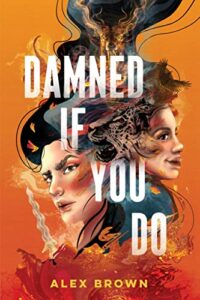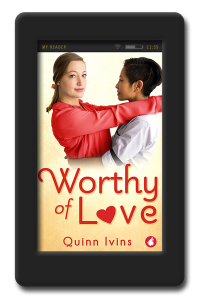Filled with imagery and stories from Filipino folklore, Damned If You Do follows high school stage manager Cordelia Scott, as she prepares to put on the annual school play, struggles with passing her classes and imagining a future for herself, and tries to push down her not-so-subtle crush on her childhood best friend, Veronica. After having sold her soul to a demon seven years prior, in a last-ditch effort to get her abusive father to leave her and her mother alone, that very demon comes back demanding that Cordelia return the favour and help him save her hometown.
At the cusp of perfectly entertaining horror comedy and peak YA fiction, this book dares to ask the question: what if your dad was such a terrible person that a demon with a habit for bad puns replaced him as your father figure and managed to be significantly better at parenting?
I think the tone and narrative voice of this novel is so perfectly aimed at its YA audience. Brown clearly knows how to expertly meld entertaining high school drama with deep-set family trauma, folding it all into a fun yet heart wrenching story. A book that can make you chuckle out loud while tears are actively streaming down your face is one worth picking up.
I really enjoyed the romance between Cordelia and Veronica. I don’t actually remember the last time I rooted so wholeheartedly for a book couple to get together, but their relationship was the perfect amount of pining, confusion, and “ride-or-die” friendship, so I couldn’t help but fall in love with them. I had so much fun with this book that I finished it within a day; I found myself simply unable to put it down.
Horror comedy sometimes falls flat for me, in that it focuses so much on making the characters “funny” that you lose a lot of the substance of the horror genre. But this book manages to keep up with the witty inner dialogue and conversational tone throughout the story, without letting everything fall so deep into the “comedy” aspect that it misses out on any depth or analysis. There’s a fascinating discussion in here surrounding trauma and father figures that really molds itself through the character development, and that really grounds you as a reader into the general message and theme of love and survival.
I also greatly appreciated the way that Brown didn’t shy away from addressing the very real effects that abuse from a parental figure can have on a child, and exploring all those complex feelings that creep up within you no matter how much you try to ignore them. Our main character struggles so much with feelings of guilt, regret, anger, and frustration, and the story really gives her that space to finally deal with all those emotions and face them head-on.
Of course, I will always adore a sapphic final girl who feels like she has the weight of the world on her shoulders, and it’s so easy to become instantly attached to Cordelia. This is the perfect book for someone who loves completely oblivious sapphics (and I mean completely oblivious), or someone who wants a fresh new take on the exploration of queerness through monstrosity in a way that is loving and positive instead of filled with repressed shame.
Representation: sapphic, biracial, Filipina main character and love interest
Trigger warnings: child abuse, violence, gore, blood, depictions of verbal abuse, mentions of physical abuse


